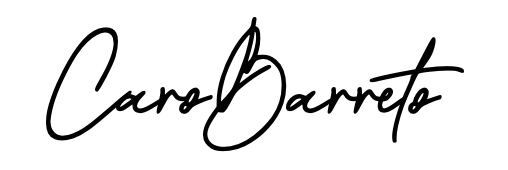Source: Memedroid / 9GAG
A social and profitable business story that creates value
Fan #1 of Duolingo
I started practicing French on Duolingo a while ago, but I wasn’t consistent and hated the ads, which made me give up. Then, a friend told me about the premium version, and I gave it a try. Oh la la, it was much better! I could practice for 15 minutes without interruptions, and my vocabulary and spelling started improving.
The app’s tricks kept me hooked. The Streak feature counts how many days in a row you use the app (just like my mom used to do to get me to brush my teeth!). Duolingo also has a “game mode” with competition leagues that motivate you to progress. The podcasts are fascinating with true stories about immigration, cultural differences, and other topics that are not trivial. But the best part is the phone widget with a crying, mad or dying green owl (I hope it’s green because it’s in favor of the environment 😁) reminding me to do my daily lesson.
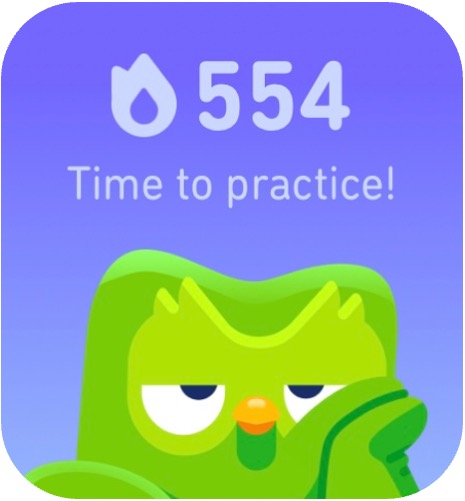
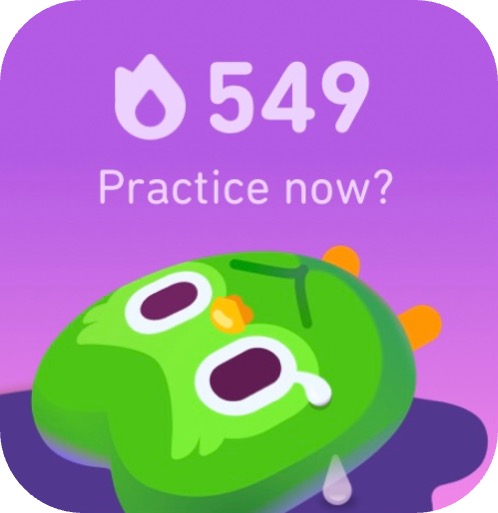
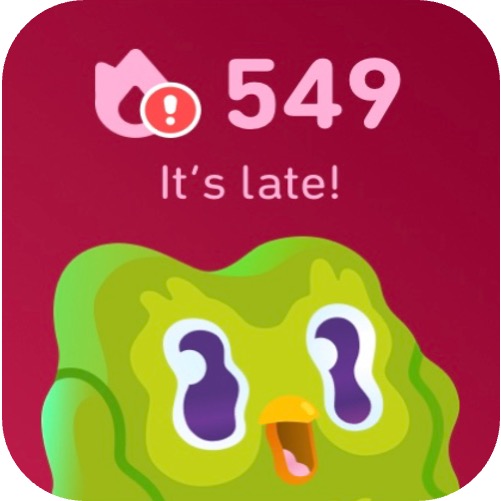
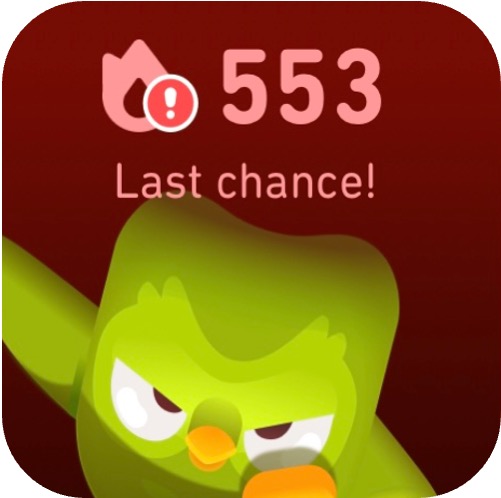
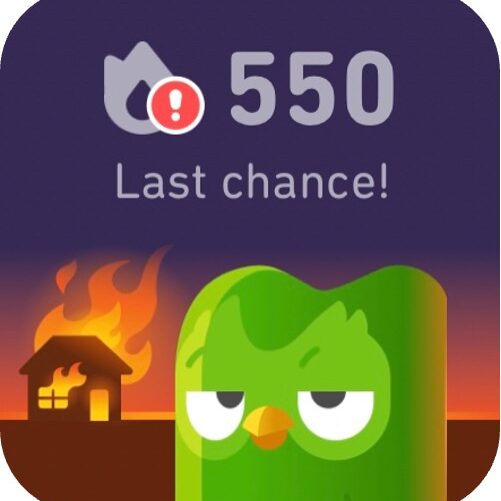

Source: Own screenshots of the Duolingo app icon
Crazy Things You Can Do to Keep Your Streak
While my husband was in the middle of a panic attack because I was in India by myself, in a city near Pakistan, and about to disconnect for 10 days from any device to start a meditation retreat (check out my post about that amazing experience), I was worried about my Duolingo streak. My beloved husband, making a sacrifice of love, accepted to learn French those days through the app while I was offline. I kept Duo happy.
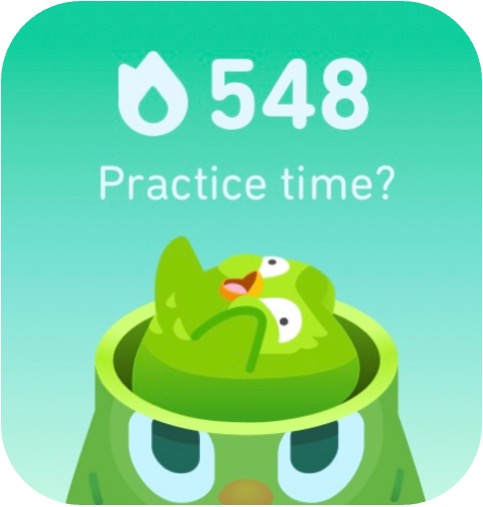


Source: Own screenshots of the Duolingo app icon
If Your Streak in Duolingo is More Than 100, Have You Considered Investing in the Stock?
You should not invest in a company just because you like it. However, I thought that if I really like the app and others do too, I could check how the company is doing financially, how the stock is performing, and who is behind the playful app that helps us learn in a fun way. For me, the social impact was crystal clear, but I wasn’t so sure about the profitability.
A Guatemalan Behind the App
Luis von Ahn is one of the co-founders of Duolingo. He was born and raised in Guatemala. He was fortunate enough to have access to English courses and speak the language, but he faced the challenges of getting into an American university as a non-native English speaker. He had to prove his proficiency by taking an in-person exam, which is expensive and only available in some cities. Lucky you if you get the score you need on the first try, but poor you (and your wallet) if you need to retake it.
Fortunately for all of us, his American dream ended up with him finishing a PhD in Computer Science. He created reCAPTCHA and made us type some indecipherable letters and numbers to confirm we are not robots—a fantastic story for another time. Here’s a video. He also kept teaching and was the thesis advisor of Severin Hacker, the other co-founder of Duolingo (and he’s not a hacker!).
Solving a Problem While Having a Huge Impact
Education was at the center of the problem they wanted to solve. Coming from a poor Latin American country, Luis understood that equal access to everyone was going to make a difference. And on top of that, English is a skill that gives you different opportunities in life to get a job, read a book, travel, or just watch a movie.
They started Duolingo with the mission “to develop the best education in the world and make it universally available.” Luis von Ahn was awarded a MacArthur fellowship, and the money was used to develop Duolingo, along with other investors’ money. But eventually, their investors asked them to start making money.
The first move, as expected, was through ads. Revenue was finally coming in, and the mission was untouched. But users like me were not happy with the ads. They took the big leap and launched a paid membership for those who wanted to go ad-free. They also kept the option to use the app for free. The results were astonishing, and you can see some numbers at the end of this post.
On the other hand, even though their environmental impact is low and not material, they are working on policies and responsible practices. It’s very incipient, but they are already working on it.
Duo and AI
We all wonder how businesses are using, will be challenged by, or will benefit from generative artificial intelligence (AI). Some people think that with sophisticated translation tools, there won’t be a need to learn a language. In that case, Duolingo will disappear. However, Google Translate has been around for so many years, and at least in my case, I still want to learn a language. Of course, Google was my best friend in India to communicate in Hindi, but I was proud of my little French when trying to have a basic conversation with the locals. Also, if you want to study abroad, you still need to prove proficiency in the language.
Duolingo is taking advantage of AI by using it to provide personalized language lessons and affordable, accessible English proficiency testing. For instance, if you want an explanation on your answer, you have the option through Duolingo Max (a paid option). Also, you can have real-world conversations.
Duo in Numbers
I was curious about how the business was doing, if there were other happy users like me, and if they made money and how. This is not a stock analysis; I only wanted to show you what I found about the company as a business, which is impressive. 2023 was a record-breaking year of user engagement, subscribers, and revenue!
First, Duolingo is growing fast! In the first quarter (Q1) 2024, they had 97 million (M) monthly active users, up from 88M in Q3 2023, which is 46% more than in 2022. Daily active users also jumped to 31M in Q1 2024, from 27M in Q3 2023, a 65% increase from 2022. And their paid subscribers hit 7.2M in Q1 2024, up from 6.6M in Q3 2023, which is 57% more than in 2022.
Second, most of their revenue, about 79%, comes from happy subscribers like me, showing they do not depend too much on ads. They also make money from the Duolingo English Test (accepted by over 5,000 institutions and competing with TOEFL and IELTS), and in-app purchases of virtual goodies.
Finally, on the financial side, total bookings (the amount they receive from a purchase of any Duolingo offering), which include all revenue sources, reached $622.2M, up 45% from last year. Subscription bookings alone were $495.5M, a 49% jump. Overall, their revenues hit $531.1M, up 44% from last year and more than double what they made in 2020. For the first time, they had a positive net income of $16.1M, turning around from a $59.6M loss last year. Their adjusted EBITDA, which is another way to measure profitability, shot up to $93.7M from $15.5M, with the margin improving from 4.2% to 17.6%. Plus, their cash flow from operating activities increased to $153.6M, and free cash flow rose to $144.3M, both much higher than last year’s numbers.
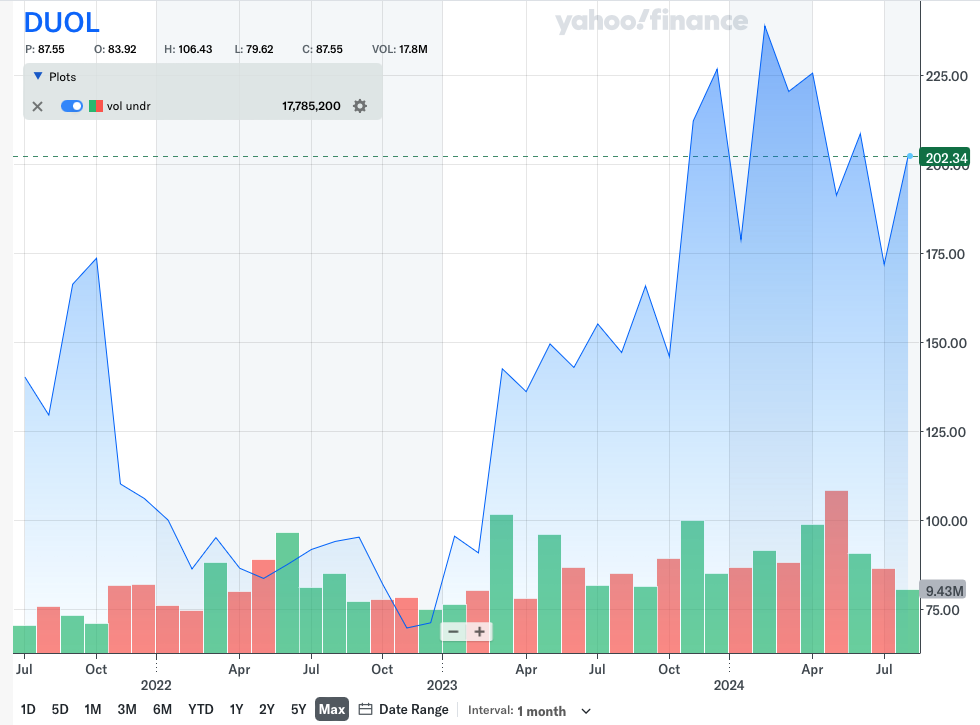
Fun facts
- Japan is the country with the longest average streaks
- Latin America is the region with the shortest average streaks
- In the US, 80% of users were not learning any language before Duolingo
- Notifications uses AI and the app knows when to send and what to say in the notifications
- Duolingo has been listed as one of the 50 Most Innovative Companies
- +40 languages to learn
- Math and music are also available
- Science-backed teaching methods
- There are studies on the real impact to evaluate the efficacy. Here one “The effects of frequency, duration, and intensity on L2 learning through Duolingo” journal of second languages studies
Give it a try!
I’ve been talking about how much I like Duolingo, and I hope you can give it a try. It won’t replace a good class, but it can complement it. It is also convenient and cheap compared to language institutes. Try to encourage kids to use it, we all need to fight together against Tik Tok. On the other hand, the business numbers are also showing how engaged and happy the users are.
Resources
Website – Podcast , Ted Talk, Financials in Interactive Analyst Center
Ps @Duo, you should consider bringing me onto your team! I’d be a perfect fit 🧑🏽🎤
A bientôt
